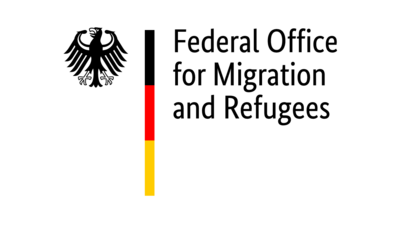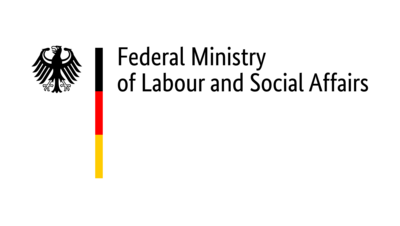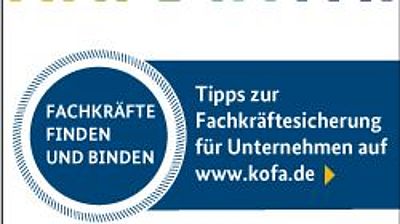German language skills are the key to successfully integrating international skilled workers into your company in the long term. You can help your international staff learn German by offering in-house language courses; alternatively, they can attend language courses offered by external providers. Find more information on how to support your qualified professionals down below.
German courses supplementary to work in the company
Encourage your new recruits to attend a language course. There are numerous federal programmes that support language acquisition:
Integration courses offered by the Federal Office for Migration and Refugees
In the integration course, German and cultural knowledge are taught. The Federal Office for Migration and Refugees (BAMF) also offers various integration courses tailored to different target groups. Find out about the application process, course procedure, costs, and duration on the website of the Federal Office for Migration and Refugees.
Occupational German language promotion
The occupational language courses (BSK: Berufssprachkurs) of the Federal Office for Migration and Refugees support you as an employer in integrating your new skilled worker into the company. In addition to occupational language courses with certification exams (with the objectives A2 to C2 according to the Common European Framework of Reference for Languages (CEFR), during the provisional budget management, only BSK with the objective B2 will start from 01.01.2025 until further notice), occupational language courses with reference to the workplace are also available.
The workplace-related occupational language courses specifically teach language skills for particular workplaces or professions. These include, for example:
- Job-BSK (100-150 units), which can be conducted directly in the company, supporting language acquisition in the workplace. More information can be found under the keyword “German courses within the company (Job-BSK),”
- Occupational language courses for academic health and healthcare professions (up to 600 units), preparing for the specialized language examination for recognizing foreign professional qualifications,
- Occupational language courses for trainees, enabling individual and continuous language promotion throughout the entire training period,
- Occupational language courses for early childhood professions, specifically tailored with practical content for work in German daycare centers.
The range of occupational language courses offered by certified training providers is published on KURSNET, the portal for vocational education and training of the Federal Employment Agency (BA). Courses are available full-time or part-time and can be offered both in-person and virtually. Hybrid courses, combining both forms, are also possible.
To attend an occupational language course, participation authorization is always required. If your new skilled worker is already working with you or is in a training or recognition process, they can apply for participation authorization directly with the Federal Office for Migration and Refugees. If your new skilled worker receives benefits under Code of Social Law II (Sozialgesetzbuch, SGB II) or Code of Social Law III (Sozialgesetzbuch, SGB III), the participation authorization is issued by the local employment agencies or job centers.
Please note that participants who are already in a socially insured employment relationship may have to pay a contribution per unit of instruction. More information about the program can be found on the website of the Federal Office for Migration and Refugees.
German courses within the company (Job-BSK)
Job-BSK are specifically designed for specialized language acquisition in the workplace and are intended to support job entry with still limited German language skills. They teach language skills from the relevant professional field that can be applied in everyday work. Job-BSK are aimed at individuals who meet the following conditions:
- German language skills of at least A2
- Persons in employment or shortly before starting such (employment contract is present)
- Persons in preparatory measures for the labor market, such as measures with the employer (MAG) or measures with the provider (MAT)
What language skills are taught in the Job-BSK?
Participants in the Job-BSK train situational communication in the workplace. Depending on the professional context, this can include the following scenarios:
- Safety instructions in the field of building cleaning
- Order confirmations in the field of warehouse logistics
- Nursing admission interviews
- Applying for leave
- Reporting problems
- Asking for support
How are the Job-BSK organized?
The learning content is determined in coordination with the employer. A Job-BSK teacher conducts a language needs assessment at the workplace in advance to tailor the lesson structure and teaching materials to the work environment. Individual coaching elements that include targeted feedback from the teacher are also planned.
Job-BSK offer you as an employer the advantage that the language courses can be attended alongside work and, if desired, also take place at your location. In addition, language acquisition is specifically geared towards communication in your workplace, and you can participate in the coordination of the learning content. When participants can directly apply their acquired language skills in everyday work, it promotes motivation and the long-term integration of your new skilled workers.
To attend a Job-BSK, participation authorization is always required. This is issued either by the Federal Office for Migration and Refugees or by the employment agencies or job centers.
More information about Job-BSK can be found on the website of the Federal Office for Migration and Refugees.
General German courses
The Kursnet portal of the Federal Employment Agency provides information on a wide range of language courses with professional relevance and for different language levels. Both part-time and full-time courses are available; courses are also offered online. Additional language learning opportunities are available at the German Adult Education Association and the Goethe-Institut. The Goethe-Institut also offers German courses for companies for the linguistic qualification of employees. Other offers for vocational German courses can be found here.






